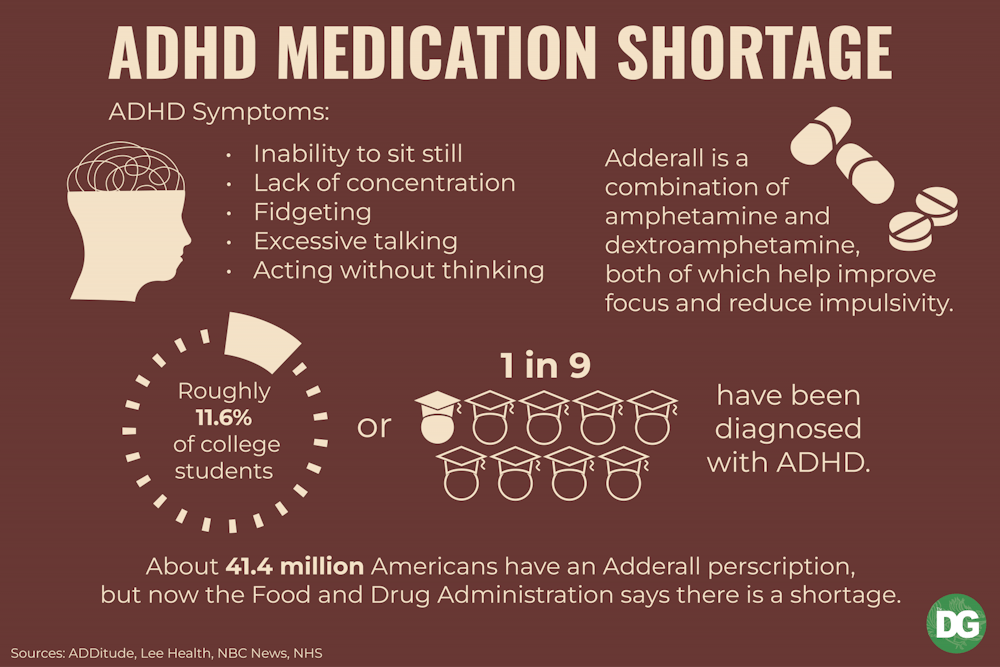Ellie Malcolm, a third-year broadcast journalism student, started taking medication to treat her attention-deficit/hyperactivity disorder, or ADHD, last year. She said the prescription helped her focus on everyday tasks, but this changed when her medicine became unavailable due to a production shortage.
“All of a sudden, you take it away and you can't have it, and you're stressed and you're overwhelmed and you just cannot concentrate,” Malcolm said. “Everything goes downhill.”
She said that her medication made it easier to manage her ADHD and balance her academic pursuits.
"I think my mental health has definitely been better because I'm actually getting out of bed and accomplishing things." Malcom said.
The medication shortage prevented her from getting her prescription refilled during finals week of her sophomore year, and as a result, her performance suffered. And Malcom's situation isn’t uncommon.
ADHD can cause people to struggle with focusing on tasks, feeling hyperactive and controlling impulses.Currently, there are production shortages of medications, such as Adderall, Ritalin and Concerta, that treat ADHD. Manufacturing delays have made it so that there is less medication available for pharmacies to order and fill prescriptions with.
The ADHD medication shortage affects individuals with ADHD and should be taken seriously. Without access to medication, the lives of people with ADHD are upended, and they cannot use medication to mitigate their symptoms. This continues to be a problem, as there doesn't seem to be an end to these periodic shortages.
Especially now, more and more college students being treated for ADHD, and these students need medication for support.
"The percentage of college students who are treated has gone up dramatically, “ Dr. Steven P. Cuffe, professor and chair of the Department of Psychiatry at the University of Florida's College of Medicine said. “Twenty years ago, maybe 2% of the students (were treated). Now it's more like 10 or 12%.”
According to the CDC, ADHD is usually diagnosed during childhood, and symptoms can continue into adulthood. The symptoms of ADHD make things like professional work, interpersonal relationships and social interactions difficult. When you struggle to focus on tasks or are hyperactive, it can make building relationships a struggle.
It is important that individuals with ADHD can treat their symptoms through therapy and medication.
“For a person that has ADHD, being on a stimulant like Adderall or Ritalin allows them to be able to concentrate and be able to focus for the period of time that that medicine is active in their body,” Dr. Elizabeth-Clare Porter, the director of counseling and psychiatry with Student Health Services, said.
ADHD isn’t only about having trouble focusing or being “spaced out” — it’s a serious deficiency in attention. It can be a frustrating experience for individuals with the disorder, as even the simple task of doing homework can feel impossible.
“A lot of times, people with ADHD take longer to complete assignments because they're constantly getting distracted," Porter said.
Medication can be an equalizer for students in their academic performance.
“Having a stimulant can allow them to complete assignments at the same period of time that their peers who do not have ADHD can," Porter said. "It also helps with organizing, so a person may find themselves better able to stay on top of tasks because they're able to organize them in a more efficient way.”

Medication can be a lifesaver for individuals with ADHD. It treats their symptoms and allows them to focus on certain tasks and improve their performance in their daily lives.
This shortage means that individuals with ADHD run the risk of not having their prescription filled in time, and some students don’t know how long until they can get it refilled, which can be very detrimental to the well-being of people with ADHD.
"People can lose jobs if they aren't able to concentrate at the level that they need to," Cuffe said. "They may not do as well on exams.”
Students with ADHD are put at a disadvantage when they do not have access to their medication. It doesn't just mean a hard day of class or not being able to pay attention to a lecture. It means you significantly fall behind.
"There are real-world implications to this,” Cuffe said.

